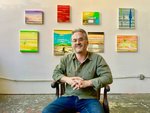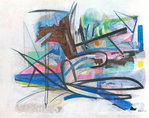Jonathan Eckel's brilliant abstract paintings (sort of like a marriage of Picasso and Jackson Pollock) are currently on display through June 30 at Awbury Arboretum's Francis Cope House.
This item is available in full to subscribers.
We have recently launched a new and improved website. To continue reading, you will need to either log into your subscriber account, or purchase a new subscription.
If you are a digital subscriber with an active subscription, then you already have an account here. Just reset your password if you've not yet logged in to your account on this new site.
If you are a current print subscriber, you can set up a free website account by clicking here.
Otherwise, click here to view your options for subscribing.
Please log in to continue |


I could not count all of the creative people I have written about over the years —authors, artists, musicians, etc. — who love being immersed in the creative process but hate the business part, i.e., trying to sell their work after it is completed. I have even been told that most creative and artistic people simply do not have the instincts it takes to sell their work.
Thus, I was surprised to find just the opposite in Jonathan Eckel, whose brilliant abstract paintings (sort of like a marriage of Picasso and Jackson Pollock) are currently on display through June 30 at Awbury Arboretum's Francis Cope House, 1 Awbury Rd. in Germantown.
Eckel, 41, grew up in Glenside, graduated from the Tyler School of Art in 2003 and has lived for the last 10 years at the Greene Street Artists Cooperative in Germantown. He started working as an art dealer at Dolan/Maxwell, prominent Rittenhouse Square art specialists, in 2015 and has “surprised myself by how much I’ve enjoyed and taken to the business side of art. In my younger years the business side seemed at odds with my creative instincts, pursuits and desires. Now, I love merging the two and finding the creativity and intuition that often goes into making a sale and connecting with clients and curators.
“One of my favorite parts of working as an art dealer is the research, history and detective work that goes into learning about certain artists and works of art from the surrealist/modernist period. It has been deeply gratifying and fits with my somewhat obsessive focus and drive. In some cases it's putting together enough research to prove the date or title of a previously unknown work of art; or in one particular case, finding the copper plate and three color proofs of a rare etching by Wolfgang Paalen (1905-1959), a favorite Surrealist artist of mine who was from Austria, spent formative years in Paris and worked mostly in Mexico.
“Introducing art collectors/lovers to lesser known artists working in the same period of interest and with as much or more skill than the better known names is great fun and helps to build a larger, more realistic and inclusive art awareness.”
The Dolan/Maxwell Gallery represents a selection of estates from 1930 to 1960. Eckel's job there has taken him to Paris once a year for the last five years or so, spending a month at a time living in Paris, working with inventory and researching Atelier 17, an experimental printmaking workshop known as being the bridge from Surrealism to Abstract Expressionism. This workshop is credited with developing revolutionary printmaking techniques.
Of course, it is almost always a struggle trying to make ends meet while pursuing a career in the arts, and Eckel's journey is no exception. From 2000 to 2005 he was a server at the tiny Citrus restaurant in Chestnut Hill (where Bahia Bowls is now) and at Cake restaurant from 2010 to 2013. He also taught at Plymouth Meeting Friends School for three years.
“I used to work double shifts two days in a row and spend the other five days painting,” he recalled. “I kept this schedule for about four years and found that having blocks of consecutive days in the studio without interruption was crucial to my artistic development ... a cheaper and wiser choice than spending a fortune on two years of grad school. Instead, I lived cheap, saved cash and painted everyday.”
While waiting on tables, Eckel had a painting included in the permanent collection at Woodmere Art Gallery and after changing his painting style from figurative and narrative to non-representational and eventually fully abstract, he began to sell his work more regularly.
Eckel is also very much interested in the abstract painting by African American artists who left the U.S. due to racial injustices they faced in their own country, even after risking their lives and fighting in World War II, to live in Paris and other European cities in the late 1940s and 1950s, where they were more welcome and respected — artists such as Beauford Delaney, Ed Clark, Larry Potter and Herbert Gentry.
Eckel has two brothers, Joel and Jeffrey, who are local beekeepers (We Bee Brothers Honey) and educators. The Awbury exhibit is open to the public Mondays-Thursdays, 10-4 p.m. There will be an artist’s reception on June 6 from 5-7 p.m.
More information at awbury.org. Len Lear can be reached at lenlear@chestnuthilllocal.com